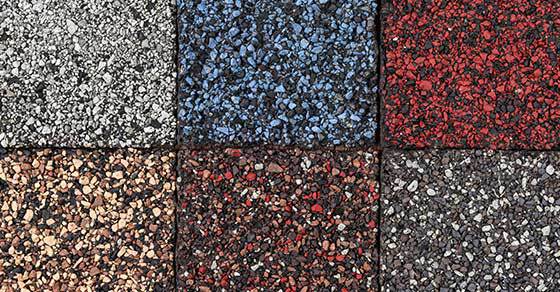Growing disposable income, rising urbanization, and an increase in construction and renovation activities are pushing demand for asphalt shingles and the associated roofing granules used to protect them.
Globally, the roofing granule industry is expected to see a fair amount of growth between 2020 to 2027. This growth, however, comes with a bit of a caveat; changing trends in roofing systems are demanding a new wave of product innovation in terms of sustainability, and that innovation requires a thorough approach to roofing granule process development.
Demand for Sustainable Roofing Granules
As demand continues to rise, several manufacturers are investing in new plants, as well as the expansion of existing ones, but these companies will have to do more than ramp up production if they are to remain successful; changing market trends are demanding producers invest in innovation as well, particularly when it comes to sustainability.
Millennials, which originally seemed to shy away from homeownership, have surprised everyone with a turnaround, making them the fastest-growing market segment, currently representing about 37% of home buyers.
This is important because the number of millennials buying homes is likely to increase, and these home buyers (not to mention future business decision makers) have different priorities than their parents and grandparents; younger generations value sustainability and they are willing to pay for it.
So where does that leave roofing granule manufacturers? As with other industries, environmental responsibility has become less of a luxury and more of a necessity for producers wanting to stay competitive.
Roofing granule manufacturers have heeded this call in an effort to meet market demand, with several new innovations:
Smog-Reducing Granules
Air pollution has been subject to growing criticism, particularly as the Covid-19 pandemic made it undeniable that human activities were largely the source of the problem.
3M has developed their smog-reducing granules as a way to fight air quality issues. The granules actually break down smog, leaving the surrounding air cleaner, a major breakthrough in the fight against pollution.
Recycled Shingles
Industry magnate, GAF, has also been working behind the scenes to make roofing products more environmentally friendly.
The company has developed a patented process to produce shingles from materials recovered from post-consumer and post-manufacture shingles.
The ability to recycle asphalt shingles has major implications for the industry going forward, as shingles are currently landfilled because they are too difficult and costly to repurpose.
“This latest innovation from GAF represents the first major step towards a circular economy for asphalt roofing shingles,” said Jim Schnepper, President, GAF. “We envision a future where every homeowner, when replacing their roof, can do so with high-quality, affordable shingles made with recycled asphalt.”
While the process primarily focuses on reusing the asphalt component, granules can also be recovered and reused.
GAF is not the only one pursuing a solution to shingle waste; Mycocycle is pioneering the science of using mushrooms to break down used shingles into components that can be used in other products and materials such as insulation, packing material, and more.
Reflective Granules
Roofs play an important role in managing the energy efficiency of a home or building. To maximize cooling efficiency, roofing granule producers have developed and continue to refine reflective roofing granules.
These granules are designed to reflect solar rays, instead of allowing the building to absorb the heat. This not only saves energy in keeping the building cool, but it also helps to reduce the urban heat island effect, another major win for sustainability.
The US Department of Energy recognizes cool roofs as offering a number of other benefits as well, including smog reduction (temperature is a factor in the generation of smog) and helping to offset global warming.
Roofing Granules from Waste
US Minerals, another major industry player, has also developed roofing granules from waste to produce more eco-conscious roofing granules. The company diverts both coal slag and iron silicate from landfills, transforming them into roofing granules that meet the stringent demands of the market.
Roofing Granule Process Development Essential
As manufacturers continue to innovate and bring more advanced products to market, testing and development services such as those offered in the FEECO Innovation Center are becoming increasingly critical.
The facility, which offers batch and continuous testing around agglomeration, coating, drying, and thermal treatment to a range of industries, has seen a noticeable increase in roofing granule-related testing.
“These manufacturers are coming to us not just to improve their existing products, or test alternative source materials, but also to improve the efficiency and sustainability of their production lines,” says Shane Le Capitaine, FEECO Process Sales Engineer. “They are looking to reuse process byproducts, limit the amount of waste they produce, and make their process as efficient as possible.”
Le Capitaine notes that testing around coloring, coating, and the thermal treatment of granules has also been on the rise in an effort to produce more advanced products. “Uniformly coating and then properly curing that coating is especially important to product quality and has become an important tool in engineering specialty products,” he adds.
The data gathered during testing in the Innovation Center is then used to engineer and manufacture custom roofing granule production equipment tailored to the unique demands of the intended application.
Conclusion
The growing emphasis around sustainability is tasking roofing granule manufacturers with improving their products and processes if they are to continue to remain competitive amid rising demand. As manufacturers rise to this challenge, process development and testing services will become ever-more important.
The FEECO Innovation Center provides a unique outlet for manufacturers looking to test nearly every aspect of granule production, revealing the process conditions necessary to produce the desired result. For more information on testing, contact us today!



